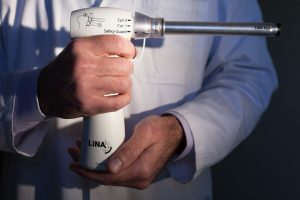Power morcellator use down 80% since FDA’s safety warning, new study finds
Aug. 29, 2016 – San Diego, CA The use of power morcellators has gone down since the Food and Drug Administration recommended against using them during hysterectomies in 2014, a new study suggests.
The study, published in the August 2016 edition of JAMA, looked at which types of hysterectomies were being performed and how often power morcellators were used both before and after the FDA’s 2014 announcement. According to researchers, the use of power morcellators went down almost 80% after the FDA recommended the device no longer be used in menopausal or post-menopausal women undergoing hysterectomy.
Power morcellators are used to chop up uterine tissue, typically during a minimally invasive hysterectomy, to make it easier to remove the organ through small surgical incisions. The device came under scrutiny a couple years ago after the FDA announced it could spread undetected cancers throughout a woman’s abdominal cavity during surgery.

The federal agency issued a safety communication in April 2014 discouraging use of the device during hysterectomies; in November of the same year, the agency issued a second communication recommending surgeons not use the device in peri- and post-menopausal women undergoing hysterectomy.
The August 2016 JAMA study identified over 200,000 women between the ages of 18 and 95 (the average age being about 48) who underwent a hysterectomy between 2013 and the beginning of 2015.
According to the study, just under 60% of women who had a hysterectomy at the end of 2013 had underwent minimally invasive surgery, and a power morcellator was used in about 13.5% of those women’s surgeries.
After the FDA’s April 2014 announcement, the use of power morcellators dropped significantly from a peak of 13.7% of minimally invasive hysterectomies at the end of 2013 to 2.8% of minimally invasive hysterectomies at the beginning of 2015.
The type of hysterectomies performed also changed after the FDA released its safety communication. At the beginning of 2013, about 27% of all hysterectomies were performed abdominally. Two years later, that number increased to nearly 32% in 2015. During roughly the same time period, the number of minimally invasive hysterectomies fell 5.8%.
Despite the increase in the number of abdominal hysterectomies, the number of complications did not seem to increase, according to researchers, who cited a growing fear in the medical community that following the FDA’s announcement the number of abdominal hysterectomies would increase, thereby increasing the number of complications. Minimally invasive surgeries are associated with fewer complications than more traditional surgeries, which require larger incisions.
The JAMA study found, however, that the number of complications remained relatively unchanged (8.3% in 2013 compared to 8.4% in 2015) despite the increase in the number of abdominal surgeries. In fact, researchers found the complication rate for abdominal hysterectomies actually declined, while minimally invasive and vaginal hysterectomies remained relatively unchanged. The authors attribute the decline in abdominal hysterectomy surgery to a decline in complications during the actual surgical procedure.
Complications generally associated with hysterectomies include damage to nearby organs, such as the bladder and rectum, and damage to the urinary tract or other pelvic structures that may require further surgeries to repair. Other complications can include blood clots, infection, excessive bleeding and adverse reactions to anesthesia.
Following the FDA’s April 2014 communication, Johnson & Johnson’s Ethicon unit pulled its power morcellators from the market and has since settled roughly 70 lawsuits ranging from $100,000 to $1 million, according to a report from the Wall Street Journal. Ethicon settled those 70-something lawsuits in March 2016 and it is poised to settle even more in the months to come.
Power Morcellator Cancer Lawsuits continue to mount against the manufacturers of these devices. If you or someone you love was diagnosed with cancer after undergoing a hysterectomy with a power morcellator, you may be entitled to compensation. With power morcellator cases already settling out of court, it is important that you act now.
The experienced Power Morcellator Attorneys at National Injury Attorneys, LLC are ready to fight for you and your rights. Call us at 1-800-214-1010 to speak with a member of our legal team and see if you qualify for a Power Morcellator Cancer Lawsuit. We are available at any time day or night, and the initial consultation is absolutely free. You can also use the form on the right-hand side of your screen.
Note: The information provided in this article is based on reports from publicly available sources, including news outlets, police reports, and eyewitness accounts. National Injury Help has not independently verified all details of the reported incident. If you find any inaccurate or outdated information, please contact us, and we will review and update the content as appropriate. The photo used in this post is for illustrative purposes only and does not depict the actual scene of the incident.
Disclaimer: The content of this article is intended for informational purposes only and does not constitute legal advice or establish an attorney-client relationship with National Injury Help. For legal assistance specific to your case, we encourage you to contact a qualified attorney.
Free Case Evaluation
Contact Us today for a FREE, Immediate Case Evaluation
Contact Us today for a FREE, Immediate Case Evaluation
Categories
Recent post
- Mesa, AZ – Jeep Overturns in Two-Vehicle Crash on Greenfield Rd
- Tempe, AZ – Injury Crash on I-10 EB at US 60 Transition Ramp
- Youngtown, AZ – Two Pedestrians Hurt in Hit-and-Run on Grand Ave
- Phoenix, AZ – Roberto Olivas muere en choque a alta velocidad en Van Buren St
- Phoenix, AZ – Brittany Geib y su perro mueren en accidente seguido de fuga en 51st Ave




